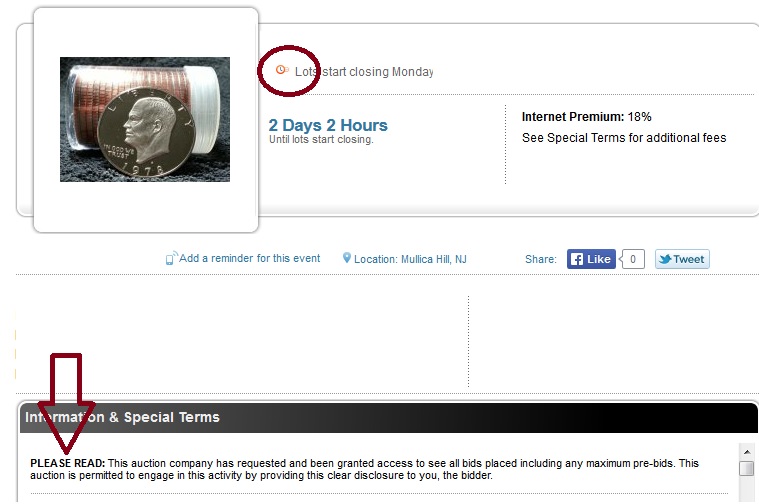 Our first installment in the series below analyzed the pros and cons of reserves. A second post looked at the issue of hidden reserves from the bidders’ perspective, and our third profiled the reserve policy of a top coin auction house. This last post asks Proxibid and our viewers to weigh in on whether reserve policies should be included in terms of service.
Our first installment in the series below analyzed the pros and cons of reserves. A second post looked at the issue of hidden reserves from the bidders’ perspective, and our third profiled the reserve policy of a top coin auction house. This last post asks Proxibid and our viewers to weigh in on whether reserve policies should be included in terms of service.
Why not? We routinely get news releases from auction houses soliciting us for coins and sharing their reserve policies with us, either informally via email or formally with a contract. Sometimes, as with RJ’s Auction Service, we learn about reserve policies in a news release.
Some reserves are set with opening bids. Those are transparent. In such case, the auction company had better have a consignment policy that charges sellers fees for unsold lots. Otherwise, the auction company stands to lose revenue.
Some reserves are hidden, with minimum bids set as low as $1, even though a reserve may actually be $300. The goal here is to inspire bidding so that bidder competition hits the reserve. In that case, the auction company also should have a consignment form that sets buyback fees or an agreement with sellers that the auction company has a right to sell lots at any price at its discretion.
And a few reserves are ghost-bid by auction companies that allow maximum-bid viewing. Proxibid allows those to engage in the practice, which we discourage, because of transparency notices–showcased in the terms of service, by the way (and for good ethical reason).
Some online auctions set high opening reserves on all except on 5-10% of select lots, luring viewers with bids and then, shortly before the live auction, setting equally high opening reserves, a practice that Proxibid should disallow pursuant to the Unified User Agreement. (See this post.)
A few timed auctions allow maximum-bid viewing–a combination we find suspect, by the way–because Proxibid’s technology should be running the show. Again, this is a practice that Proxibid should ban, even if the auction company believes it is harmless, because it sends a chilling message. Why view bids if your auction is timed? Just wait until it is concluded, and you’ll see how lots sold!
Finally, we understand that the auctioneer’s primary concern is pleasing the consignor. That can be done in a variety of ways, other than ceding your rights to reserve. You can advertise. You can invest in superior photography. You can learn how to write accurate numismatic descriptions. You can advertise in your local newspaper for coins, purchase them, and then offer them in Proxibid auctions, completely bypassing the consignor.
That said, we wonder how our viewers–both auctioneers and bidders–feel about reserve policies being listed in terms of service. Should Proxibid require this? Is it the bidders’ right to know?
We think it is. Proxibid’s brand functions on one word, and one word only: TRUST. Trust requires transparency.
What’s your opinion?
Proxiblog is an independent entity with no connection to the auction portal Proxibid. Our intent is to uphold basic numismatic standards as established by the American Numismatic Association and the National Auctioneer Association and to ensure a pleasurable bidding experience not only on Proxibid but also on similar portals such as iCollector and AuctionZip.
 We hate to think that this option allows offsite shill bidding.
We hate to think that this option allows offsite shill bidding.




